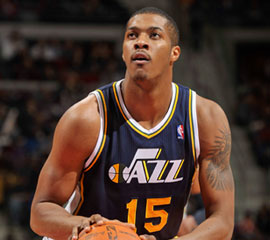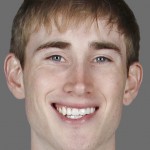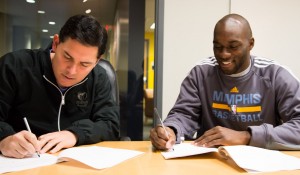As you can see, Memphis Grizzlies small forward Quincy Pondexter had quite a treat waiting for him on Halloween.
That’s Pondexter, a member of the 2010 draft class, signing his contract extension, reportedly worth $14 million over four years.
Pondexter became the sixth member of the 2010 draft to get an extension, and might be the last. Teams have until midnight ET to lock up players drafted three years ago with long-term contracts, and no one else seems close to a deal.
Pondexter joined John Wall, Paul George, Larry Sanders, DeMarcus Cousins and Derrick Favors as those who have gotten extensions. His is the first that has not averaged eight figures per season.
Earlier this month, the Grizzlies appeared to be targeting backup forward Ed Davis for an extension. But the sides reportedly were far apart, and the focus shifted to Pondexter, whose distance shooting is more valuable to how his team plays than the dime-a-dozen game of Davis.
Two more players from the 2010 draft appear to be likely candidates for big long-term extensions – Phoenix Suns guard Eric Bledsoe and Utah Jazz forward Gordon Hayward.
However, neither player is reportedly close to a deal. And ironically, both are impacted by the four-year, $49 million package given to Favors, the most recent player to receive an extension.
Bledsoe is impacted because like Favors, he spent his first three seasons showing incredible promise primarily as a backup. No one questions whether he can start; the question is whether he can star, which is expected of players making $10 million per season.
And Hayward is impacted because he is Favors’ teammate, and the small-market Jazz cannot afford to be a tax team. They also have Enes Kanter, Alec Burks and Trey Burke in line for extensions over the next several years.
Below is a rundown of all 30 first-round picks in the 2010 draft, their current status and their prospects for long-term security.
1. John Wall, Washington (5 years, $80 million): Was Wall just in the right place at the right time? His body of work isn’t appreciably better than Jrue Holiday or Stephen Curry, who got extensions averaging eight figures annually. And he is nowhere near Derrick Rose or Russell Westbrook, who were maxed out. But GM Ernie Grunfeld couldn’t sell hope to his playoff-starved fan base by playing hardball with the closest thing he has to a star.
2. Evan Turner, Philadelphia: Wrong place at the wrong time. His inconsistency and incremental improvement has been somewhat maddening but he certainly deserves an extension, perhaps $32 million over four years. But long-term contracts aren’t part of new GM Sam Hinkie’s plan. Without an extension, Turner will be a restricted free agent next summer, meaning Hinkie still has some control. And with a qualifying offer of $8.7 million due to be made, he might even be traded at the deadline. Can’t let him ruin Tankapalooza.
3. Derrick Favors, Utah (4 years, $49 million): GM Dennis Lindsey probably could have waited until next summer to pay Favors but chose to do it now because he is slotted as a starter, which means his numbers will climb and make him worth more on the open market as a restricted free agent. But by signing Favors now, Lindsey opened two cans of worms. The first is setting the bar for fellow big Enes Kanter, who comes due for his own  extension a year from now, when he will have a season as a starter under his belt. The second is negotiating an extension with Gordon Hayward, who right now is clearly Utah’s best and most-liked player.
extension a year from now, when he will have a season as a starter under his belt. The second is negotiating an extension with Gordon Hayward, who right now is clearly Utah’s best and most-liked player.
4. Wesley Johnson, LA Lakers: Already on his second contract. Unfortunately, it’s not an extension but a veteran’s minimum deal to be Kobe Bryant’s caddie. Another fantastic draft pick by former Minnesota GM David Kahn.
5. DeMarcus Cousins, Sacramento (4 years, $62 million): Allow us to play Monday morning quarterback for new owner Vivek Ranadive. On skill alone Cousins should have gotten a max extension, which he did, at $62 million over four years. But here’s a thought process: If you were going to max out Cousins, why not wait until the summer when he becomes a restricted free agent and allow other teams to set the market? It would be the same money for one less year and it will afford the Kings another season to see if Cousins is maturing at all, which is the biggest issue they face.
6. Ekpe Udoh, Milwaukee: Not a chance, especially after the Bucks extended Larry Sanders. And if John Henson continues his improvement, Udoh’s prohibitive qualifying offer of $5.9 million could make him an unrestricted free agent next summer.
7. Greg Monroe, Detroit: In March, agent David Falk said Monroe would wait until 2014 to talk about an extension, an obvious negotiating ploy to ensure a max deal for his client by going on the open market as a restricted free agent. The expiring deals of Charlie Villanueva and Rodney Stuckey give Pistons GM Joe Dumars the room he needs to max out Monroe now, but there has been some loud talk that he won’t move on Monroe until the summer. Apparently, nothing is going to happen here, and that is a very risky move.
8. Al-Farouq Aminu, New Orleans: The Pelicans did not pick up Aminu’s fourth-year option worth $3.7 million, making him a free agent last summer. He ended up re-signing with the Pelicans, inking a one-year deal for – yep – $3.7 million.
9. Gordon Hayward, Utah: Hayward should have been Lindsey’s priority – even though Favors may have a higher ceiling – because he has shown more to this point and is adored by the Jazz faithful. After Favors signed, Hayward said he is not worrying about whether or not he gets an extension, which is not true but the right thing to say. The neighborhood of $36 million over four  years would have gotten it done – until Favors signed for more.
years would have gotten it done – until Favors signed for more.
10. Paul George, Indiana (5 years, $90 million): The best player of this draft thus far. While the reported offer of $90 million over five years may seem a little steep (that number anticipates an All-NBA Third Team selection this season), George is nowhere near his ceiling and could mature into a top-five player at some point during his extension. Ask yourself this question: Would you rather have George or Carmelo Anthony right now?
11. Cole Aldrich: Made the Knicks on a non-guaranteed deal, proving that not all big men get paid. He was drafted by New Orleans and traded to Oklahoma City for Quincy Pondexter, proving also that Sam Presti has made mistakes besides dealing James Harden.
12. Xavier Henry, LA Lakers: Following the Wesley Johnson career path – lottery pick, multiple teams, fourth-year option not picked up, virtually no interest as a free agent, signed to a minimum deal by the Lakers to fill out their horrid roster.

Milsap – – is a small big or a big small? Or just didn’t count because he was a $9m/yr bargain?
However, sometimes Big men take less money: Andray Blatche re-signed for 1.375 Million and Andrei Kirilenko signed for 3.18 million with the Nets.
When you get (keep) big men for cheap, your team will have to be reckoned with.